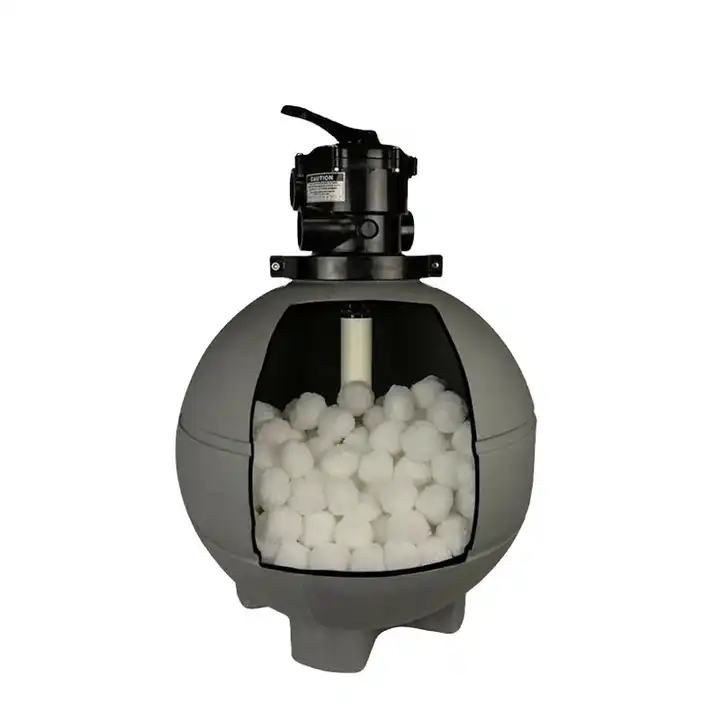The filter ball is an essential component during pool maintenance as it keeps the water quality clear. However, many people often overlook these points when cleaning these filter balls, which affects the effectiveness of the filter balls and the water quality. This article introduces in detail several key points on how to clean swimming pool filter balls so that you can better maintain the water quality of your swimming pool.

Ⅰ. Why do you need to clean swimming pool filter balls regularly?
Cleaning can effectively remove impurities, sediments, and microorganisms on the surface of the pool filter balls to avoid their accumulation, thereby reducing the load on the filtration system. Clean filter balls can more efficiently remove impurities in water, thereby improving water transparency and cleanliness.
In addition, regular cleaning can also maintain the original structure and function of the filter balls, ensure their normal operation, and give users a fresh and healthy swimming environment. If the swimming pool filter balls are not cleaned for a long time, the water quality will be seriously affected.
First of all, accumulation on the surface of the filter balls will form a breeding ground for bacteria, algae, and other microorganisms, increasing the risk of pathogenic microorganisms multiplying in the water.
Secondly, the clogging of the filter balls will cause the water flow to be blocked, reducing the efficiency of the filtration system and making it more difficult for pollutants in the water to be effectively filtered, resulting in turbid and unclear water. Long-term neglect of cleaning may also lead to damage and aging of the filter balls, affecting the normal operation of the entire water treatment system.
Generally speaking, regular cleaning is recommended, usually every 1 to 2 months, to ensure the filter balls remain in optimal condition. In high-pollution environments or during busy swimming seasons, more frequent cleaning may be required.
Ⅱ. What should we pay attention to when cleaning the filter balls?
1. Do not backwash
When you use swimming pool filter balls, never backwash them. The spherical design and tight arrangement of filter balls are key to their efficient filtration.
Backwashing disrupts the shape and arrangement of these filter balls, thereby reducing their filtration performance. If necessary, replacement of the filter balls should be considered. They can be removed from the filter tank for hand cleaning to selectively remove dirt from specific areas without damaging the overall filter structure, thus maintaining the efficiency of Filter Balls.
2. Do not use flocculants, clarifiers, or metal removal products
Effect of flocculants
In conventional swimming pool water treatment, flocculants are used to aggregate tiny suspended particles into larger clusters that are easier to capture by the filter. The flocculant may cause the filter balls to agglomerate into large pieces, destroying their original structure and affecting the filtration effect.
Clarifier problem
Clarifiers are often used to increase the clarity of water by depositing or coagulating fine particles. The swimming pool filter ball already has strong filtration performance. The use of clarifier may be too strong, causing the filter balls to excessively clean particles in the water, forming “foaming” and reducing the filtration efficiency.
Metal Remover Challenges
Some metal removers are used to reduce metal ions in water and prevent water quality problems. The material of the filter balls may react differently to the metal remover, causing the surface of the filter balls to be damaged or chemically reacted, thus affecting their filtration performance. Also, metal removers may react with the materials in the filter balls, affecting water quality.
3. You can use a washing machine or dryer for drying
The filter balls are designed with convenience in mind and can easily be placed in regular washers and dryers for cleaning and drying. Easy to handle and non-toxic. Due to their lightweight (less than 2 pounds for a box), they are easy to carry. The filter balls can filter particles down to 3 microns. Due to the adaptability of the filter balls, users do not need to purchase additional professional equipment and only need to complete the maintenance process with common household equipment.
Therefore, by cleaning the swimming pool filter balls, we gain a deeper understanding of the importance of maintaining this critical component. As long as proper cleaning procedures and preventive measures are followed, the service life of the filter balls can be effectively extended while maintaining good filtration performance, and the water quality in the swimming pool can be guaranteed to be clean and hygienic.


